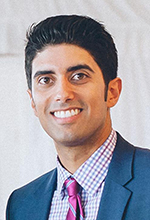Posts Tagged ‘Boston’
Breakstone, White & Gluck and Cambridge Police Team Up for Children’s Bike Helmet Giveaway During National Bike Safety Month
With a donation from Breakstone, White & Gluck, the Cambridge Police Department will distribute bicycle helmets to children who need one during National Bike Safety Month.
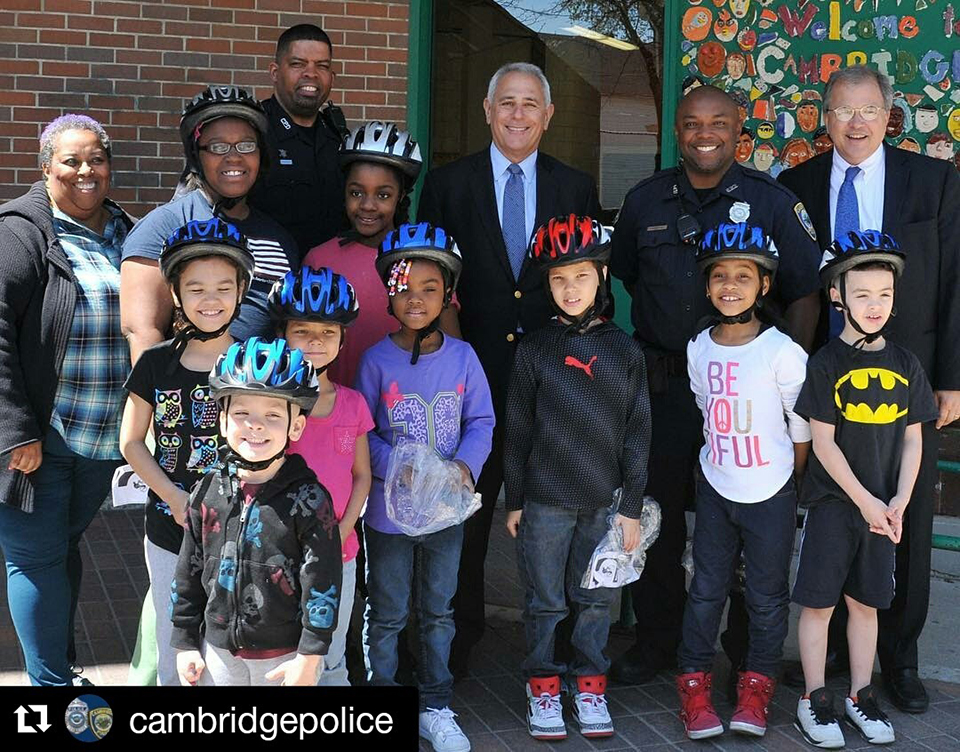
Photo: Attorney Ronald Gluck and David White of Breakstone, White & Gluck gather with children at the Cambridgeport School, Assistant Principal Audrey M. Sturgis and Cambridge police officers Che Santos and Anthony Santiago. Breakstone, White & Gluck was pleased to donate children’s bicycle helmets to the Cambridge Police Department for National Bike Safety Month in May 2016.
Cambridge Police has announced its first “helmet voucher” program as part of its National Bike Safety Month initiatives in May. Police officers will specifically be looking for children who are riding bicycles without a helmet throughout May and hand them a “helmet voucher,” which can be redeemed for a free bicycle helmet at the Cambridge Police Department.
Breakstone, White & Gluck donated 140 bicycle helmets to the Cambridge Police in hopes of keeping children safe and preventing traumatic brain injuries from bicycle accidents. The donation was part of our Project KidSafe campaign, which has donated more than 10,000 bicycle helmets to children since 2013.
Massachusetts law requires any person 16 years old or younger riding a bicycle to wear a helmet. By wearing a helmet, cyclists can reduce their chance for head injury by 50 percent, according to the Insurance Institute for Highway Safety.
This is a special donation and Attorney Ron Gluck and Attorney David White joined Cambridge Police at the Cambridgeport School for an unofficial kick off last week. Here are some photos:
Attorney Ron Gluck and Attorney David White join children at the Cambridgeport School along with Audrey M. Sturgis, assistant principal, and Cambridge police officers Che Santos and Anthony Santiago, to kick off the bike helmet giveaway during National Bike Safety Month.
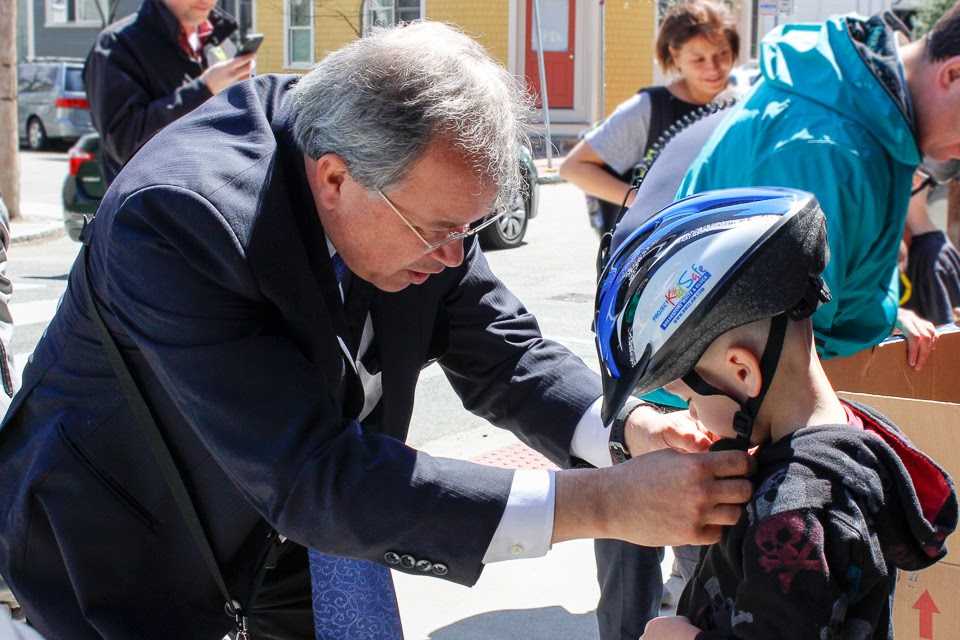
Attorney David White helps a child fit a bicycle helmet.
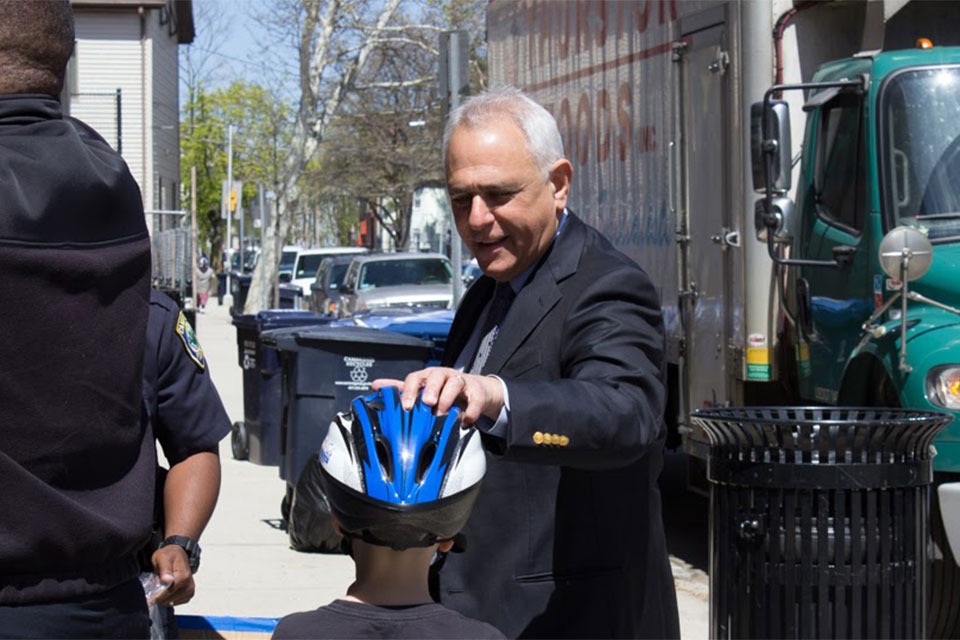 Attorney Ron Gluck finishes fitting a helmet.
Attorney Ron Gluck finishes fitting a helmet.
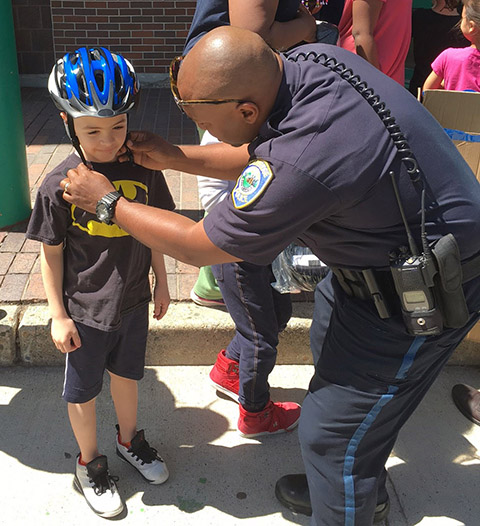 Cambridge police officers will distribute the bicycle helmets – and also show children how to properly fit them.
Cambridge police officers will distribute the bicycle helmets – and also show children how to properly fit them.
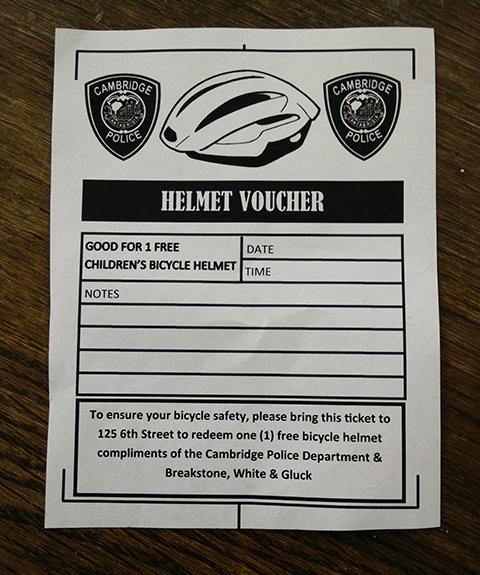 Cambridge Police will distribute these vouchers to children who are not wearing bicycle helmets during May.
Cambridge Police will distribute these vouchers to children who are not wearing bicycle helmets during May.
For more information on how to properly fit a bicycle helmet, visit our Project KidSafe webpage.
About Breakstone, White & Gluck
Breakstone, White & Gluck is a Boston personal injury law firm which is committed to the safety of all bicyclists in Massachusetts. We have over 100 years combined experience representing bicyclists injured by the negligence of others. If you, or a member of your family, has been injured in a bicycle incident, please feel free to contact us for a free legal consultation at 800-379-1244 or 617-723-7676 or use our contact form. Thank you and RIDE SAFE!
Massachusetts Social Host Law: Teenagers and Even Parents Can Face Criminal Charges and Financial Losses for Underage Drinking
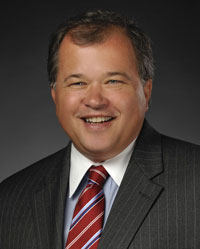 During prom and graduation season, students should be enjoying their friends and last days of high school. But this time can turn painful if you or your teenager allow underage drinking in your home.
During prom and graduation season, students should be enjoying their friends and last days of high school. But this time can turn painful if you or your teenager allow underage drinking in your home.
Breakstone, White & Gluck cares about the safety of teenagers on the road and offers these tips and reminders about the Massachusetts Social Host Law, M.G.L. c. 138, § 34.
“Very few parents realize just how much is at stake when they allow underage drinking in their home,” said Attorney David W. White of Breakstone, White & Gluck. “You may have to live with the painful knowledge that you contributed to a car accident which caused serious injury or death. Plus, you may have to serve jail time and could even lose your home to a lawsuit.”
Under the Social Host Law, it is a criminal offense for parents and teenagers to provide alcohol to anyone who is underage for consumption in their home. It is also illegal to allow a minor to bring alcohol from elsewhere to drink in your home.
You can also be charged if underage guests are drinking at other places you control, such as a hotel room, a vacation house, or a rental property.
Consequences
If you are charged under the Massachusetts Social Host Law, you could face a fine up to $2,000, imprisonment for up to a year or both. You may also face a civil lawsuit. Your homeowner’s insurance policy may or may not cover the full amount.
You could also be held civilly liable if you provide your teen alcohol to drink at someone else’s home and they later injure someone while driving.
These Cases Really Do Happen
Teenagers and adults are charged criminally for violating the Social Host Law every year in Massachusetts. For example, in December 2015, a Saugus couple – two teachers – were sentenced to jail for hosting an August 2013 party at their home where teens were drinking. Police learned about the party when a 16-year-old became ill and had to be treated at a local hospital.
The two teachers – one an Everett High School teacher – were sentenced to 30 days in jail, with the balance suspended for two years. During that time, they must stay drug and alcohol free and perform 50 hours of community service.
There have been many other criminal cases in Massachusetts. There have also been civil cases.
Attorney David White provided legal commentary on one 2014 case for Fox 25 TV News. A 23-year-old man was ordered to pay $2 million to the parents of a Salem State College student who consumed alcohol at a party he hosted. She was killed in a car accident after she left, in a car driven by her boyfriend who had been also been drinking at the party. Read this coverage.
Here are a few safety tips for you and your teen:
Tell Your Teen There is Zero Tolerance for Underage Drinking. Tell your teen there is zero tolerance for violating the Social Host Law or any underage drinking. Explain what is at stake for them and your whole family.
Help Your Teenager Plan. Help your teenager develop a safe after-prom or graduation plan. Some high schools or community groups organize events as safe havens where there will be no alcohol.
Have Your Teen Commit to Safety. Ask your teen to sign a pledge not to drink or get in the car with others who have been drinking. Here is one pledge from Mothers Against Drunk Drivers (MADD). You can find others online or create your own.
Also, tell them they must always stick with the schedule when they are out with friends and call you beforehand about changes or unplanned stops.
Safety Code.Finally, have a safety code you can use with your teenager. If they call you during the evening, you can ask them if they feel safe or want to come home. That way you, as the parent, can take the blame for prohibiting any change of plans. Your teen can save face by “blaming” you and telling their friends they cannot go out this time.
About Breakstone, White & Gluck
The Boston personal injury attorneys at Breakstone, White & Gluck have over 100 years combined experience handling serious car accidents. If you have been injured, it is important to learn your rights. For a free legal consultation, contact us at 800-379-1244 or 671-723-7676 or use our contact form.
Attorney Marc Breakstone Interviewed by Fox 25 TV About Accident Reconstruction in Crash that Killed State Trooper
Fox 25 TV has reported the driver who hit and killed a Massachusetts state trooper has left the hospital. He is scheduled to appear in court and be criminally charged, but has not been formally charged yet.
David Njuguna, 30, of Webster, is expected to appear in Dudley District Court in about a month and be formally charged with negligent operation of a motor vehicle, failure to stay within marked lanes and speeding, State Police told the news station. He is currently out free without court bail conditions, though his driver’s license has been revoked.
 Fox 25 TV asked Attorney Marc Breakstone, who has represented car accident victims in Massachusetts for 30 years, why criminal charges have not been filed already.
Fox 25 TV asked Attorney Marc Breakstone, who has represented car accident victims in Massachusetts for 30 years, why criminal charges have not been filed already.
Breakstone said State Police have a defined process for handling accident reconstructions and are following it.
“These are to be considered preliminary charges until the state reconstruction team completes its analysis, issues its determination whether or not negligence was involved in the death of this officer,” Breakstone said.
Additional charges may be filed after the accident reconstruction is complete.
Earlier this month, Njuguna’s car reportedly veered across three lanes of traffic at a high rate of speed on the Massachusetts Turnpike in Charlton, hitting and killing State Trooper Thomas Clardy, who was in the breakdown lane making a traffic stop. Clardy, a 44-year-old father of four, had been a state trooper since 2005.
Njuguna, 30, was injured in the car crash and transported to UMass Memorial Medical Center in Worcester. He suffered a concussion, two broken wrists and a thigh wound in the crash, according to The Boston Globe. Relatives later told a Globe reporter he had no memory of the crash.
Fox 25 TV reported sources said investigators are looking at the possibility that Njuguna intentionally hit the State Police officer’s cruiser.
Breakstone said that would be hard to prove.
“If there is evidence from the state police reconstruction analysis that this was an intentional act he may be charged with murder,” he said.
About Breakstone, White & Gluck
The Boston personal injury attorneys at Breakstone, White & Gluck have over 100 years combined experience handling motor vehicle accident cases resulting in serious personal injury or wrongful death. If you have been injured, it is important to learn your rights. For a free legal consultation, contact us at 800-379-1244 or 617-723-7676 or use our contact form.
Study: Pedestrian Fatalities Are Rising in Massachusetts, Across U.S.
Walking, even in the crosswalk, is becoming more dangerous.
The Governors Highway Safety Association (GHSA) is projecting a 10 percent increase in pedestrian fatalities in traffic crashes across the U.S. last year. This marks the largest increase in four decades, since data was first collected.
The official tally shows an estimated 2,368 pedestrians were killed between January and June of 2015. Researchers expect annual figures to reach the 10 percent mark.
In Massachusetts, 34 pedestrians were killed during the first half of 2015, up 26 percent from 27 fatalities in 2014.
Already in 2016, there have been numerous pedestrian fatalities. WalkBoston, a non-profit advocacy group, recently reported 11 people were killed while walking in Massachusetts in January alone. The accidents were reported in South Hadley, Malden, South Yarmouth, Worcester, Roslindale, Dorchester, Reading, Framingham, South Boston, Quincy and other communities.
In at least four cases, pedestrians were tragically killed while walking in a crosswalk, where they should have special protection under Massachusetts law.
“The law is clear. Pedestrians have the right of way when crossing the street in a crosswalk or at an intersection with the “Walk” signal,” said Attorney Ronald E. Gluck, who has represented victims of pedestrian accidents in Boston for 35 years.
Gluck added, “Drivers who disobey this law can expect to face stiff consequences. They can expect to be charged criminally, especially if there is injury or death. But a police officer can charge any driver who violates the law, even if there is no injury. They can also expect to face consequences in a civil case brought by the injured pedestrian or the family of a pedestrian who was killed.
About Our Experience
Attorney Ronald E. Gluck recently negotiated a $1.25 million settlement for the family of a woman who was hit and killed in a crosswalk in Massachusetts. Read the case report here. To learn more about the law firm, visit our website.
.
Panel Voir Dire Embraced by Judges and Attorneys in First Year
A front page story in Massachusetts Lawyers Weekly reported that judges in the Commonwealth have embraced attorney-panel voir dire. The process was introduced in February 2015 and in the first year, lawyers conducted panel voir dire in 14 percent of Superior Court jury trials.
There was a pilot project for a group of judges to use panel voir dire in most cases, except for life-felony matters or cases with good cause not to use it. While 15 Superior Court judges were part of the program, 38 of the 80 judges ended up trying panel voir dire.
“…The response of judges is extremely encouraging,” said Attorney Marc L. Breakstone.
While plaintiffs’ lawyers are seeking to use panel voir dire, defense attorneys and prosecutors requested it more frequently in criminal cases this first year. There was some form of attorney participation in voir dire in 81 percent of criminal impanelments and 54 percent of civil ones, according to Massachusetts Lawyers Weekly.
Attorney Breakstone predicted judges and attorneys will use panel voir dire for more cases going forward.
“Ultimately, judges will see its utility in every case as a time-saver and as a justice-enhancer. Lawyers and judges have a very steep learning curve,” Attorney Breakstone said.
About Attorney Marc L. Breakstone
Attorney Marc L. Breakstone has established a reputation as one of the top medical malpractice and personal injury lawyers in Massachusetts and New England. Attorney Breakstone has represented seriously injured clients in medical malpractice and personal injury cases since 1986. He is a founder and principal at Breakstone, White & Gluck since 1992. Attorney Breakstone works tirelessly to ensure that his clients receive full and fair compensation as well as achieve the most favorable medical result. He has been recognized as a Top 100 New England Super Lawyer, a Top 100 Massachusetts Super Lawyer and a Massachusetts Super Lawyer in Plaintiff’s Medical Malpractice.
About Breakstone, White & Gluck
The Boston personal injury attorneys of Breakstone, White & Gluck have over 100 years combined experience representing clients who have been seriously injured by negligence in Massachusetts. If you have been injured, it is important to learn your rights. For a free legal consultation, contact us at 800-379-1244 or 617-723-7676 or use our contact form.
DiCarlo: SJC tells Workers’ Comp Insurers: You Can’t Get What You Don’t Pay For
In a major victory for the rights of injured workers, the Supreme Judicial Court ruled today that pain and suffering damages, to which injured workers are entitled in their accident cases, are not subject to liens from workers’ compensation insurance companies. As a result of the ruling, workers will be able to keep more of their personal injury settlements and verdicts.
Until today, there was confusion over the relationship between workers’ compensation liens and damages paid by a third party to employees for worksite injuries. If an employee gets injured, he or she is entitled to workers’ compensation for lost wages, medical bills, and other specific damages. But workers’ compensation insurance does not pay for pain and suffering damages.
If the worker collects workers’ comp, then successfully sues a third party (not his employer) for those injuries, he or she has a duty to reimburse the insurance carrier up to a point. The mechanism to regulate reimbursement to the insurance company is General Laws c. 152, § 15. The statute provides that an employer can recover its workers’ compensation payments to its employee, if that employee recovers money from a third party.
But, as mentioned above, workers’ compensation pays for lost wages and medical expenses. In a tort lawsuit, an injured party is entitled to more than that, including damages for pain and suffering. In the case where an employee simply recovers lost wages and medical expenses from a third party, there is no dispute that that money is returned to the workers’ compensation insurer in the amount that was paid. Any excess, the employee keeps. But, what about when an employee also gets money for pain and suffering? Does the workers’ compensation insurer get that money back, too?
Today, the SJC said, in no uncertain terms, no. They didn’t quite say “you can’t always get what you want.” But, they did say, you get can’t what you don’t pay for. Workers’ compensation does not pay for pain and suffering. So, if an employee gets a recovery that specifically sets aside damages for pain and suffering, that employee keeps that set-aside amount. Anything else is liable to go back to the workers’ compensation insurer for the amount that was paid (minus its fair proportionate share of attorney’s fees and expenses).
The cases were DiCarlo v. Suffolk Constr. Co., SJC docket no. 11854; Martin v. Angelini Plastering, Inc., SJC docket no. 11853 (both decided February 12, 2016).
For a more detailed analysis, click here.
About Breakstone, White & Gluck
The Boston personal injury lawyers at Breakstone, White & Gluck have over 100 years combined experience representing motorists, pedestrians and cyclists who have been seriously injured in car accidents. If you have been injured, it is important to learn your rights. For a free legal consultation, contact us today at 800-379-1244 or 617-723-7676 or use our contact form.
Woman Killed By Flyaway Manhole Cover on Southeast Expressway
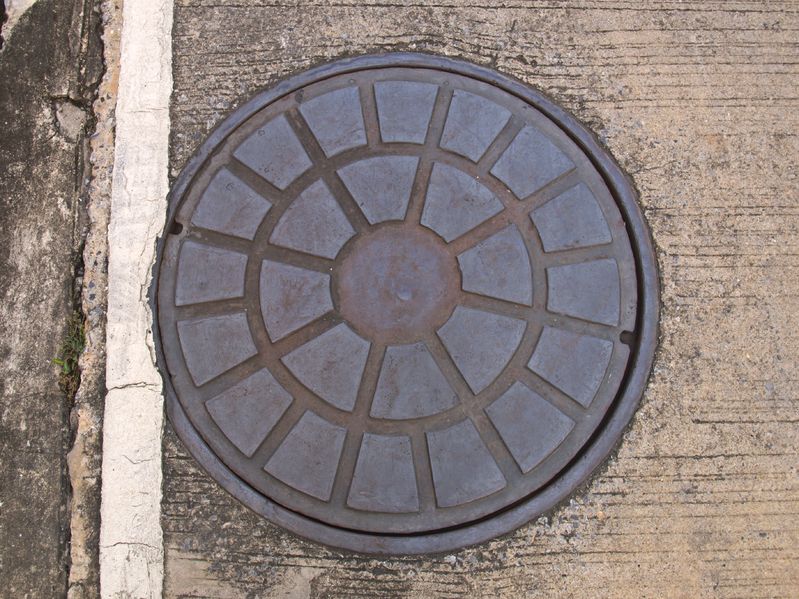 A woman died tragically this morning on the Southeast Expressway heading southbound, when a manhole cover became dislodged, went airborne, struck the front windshield and exited the rear windshield. She was killed instantly. The incident occurred in the Thomas P. O’Neill Junior Tunnel just before the southbound end of the tunnel.
A woman died tragically this morning on the Southeast Expressway heading southbound, when a manhole cover became dislodged, went airborne, struck the front windshield and exited the rear windshield. She was killed instantly. The incident occurred in the Thomas P. O’Neill Junior Tunnel just before the southbound end of the tunnel.
The woman’s vehicle came to a rest in the left-hand lane of the Southeast Expressway, a short distance from the Massachusetts Avenue exit, with large gaping holes in the front and rear windshields. A state police spokesperson commented that the cause of the manhole cover to become dislodged is under investigation.
The focus of the State Police investigation will be what caused the manhole cover to become a projectile which killed this unsuspecting driver. Manhole covers, when properly installed and maintained, should remain in place. It needs to be determined whether any work had been done recently on or around this manhole.
Attorney Marc Breakstone, who has litigated personal injury cases involving roadway defects and manholes, was interviewed by The Boston Globe.
“I’m guessing the rear wheel or wheels of a heavy vehicle passed over the manhole, catching the exposed lip of the cover, and from the traction of the tire dislodged and caused the cover to become a projectile which flew through the passenger compartment of this poor woman’s car,” he said, when interviewed a few hours after the accident. Read the full article.
The typical manhole used on our state highways is constructed of cast-iron or concrete or made out of a combination of the two. They typically weigh upwards of 110 pounds and are designed, once in place, to remain in place. The weight, shape and fit of manholes are designed to help keep them in place when traffic passes over them. This manhole cover may have become dislodged as a result of either improper placement, improper maintenance of the manhole and/or improper manufacture of the cover.
About Breakstone, White & Gluck
The Boston personal injury attorneys at Breakstone, White & Gluck have over 100 years combined experience representing clients in serious motor vehicle accident cases involving injuries and deaths due to defects in roadways and flying projectiles. If you have been injured, it is important to learn your rights. For a free legal consultation, contact us today at 800-379-1244 or 617-723-7676 or use our contact form.
Annual Walk to the Hill for Civil Legal Aid: Lawyers, Advocates Seek $27 Million Budget for Low-Income Services
We joined hundreds of lawyers at the Massachusetts State House Thursday to lobby for increased funding for civil legal aid. We gathered as part of the 17th Annual Walk to the Hill for Civil Legal Aid. Funding is in crisis in Massachusetts, with nearly two-thirds of eligible low-income residents who seek help being turned away.
With an increase, more people will be able to stay in their homes, find shelter and avoid hardship. Please keep reading this blog on the $27 million budget appropriation sought and visit this page to contact your legislator.
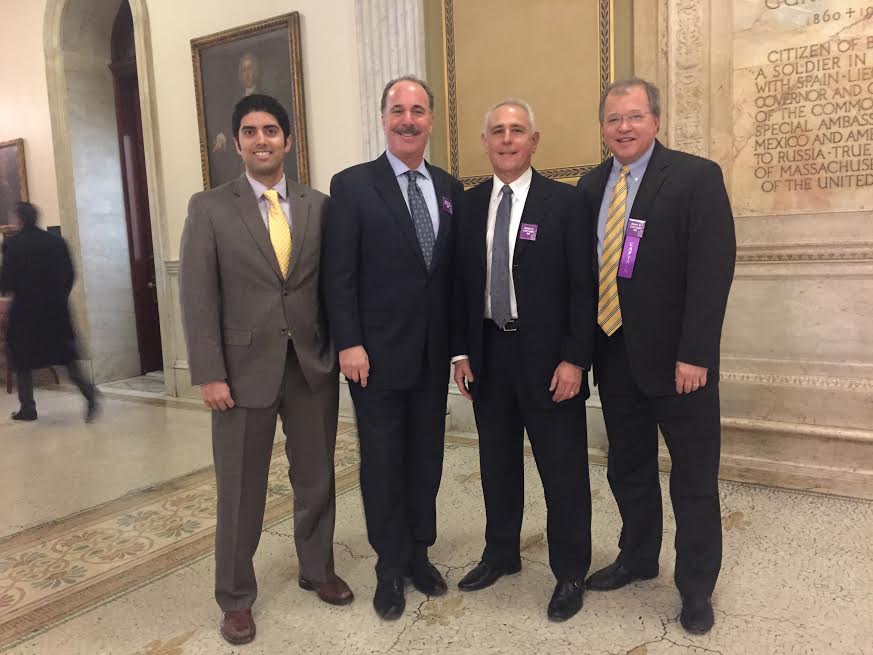
Right to Left: Attorney David W. White, Massachusetts Bar Association President (2007-2008), Attorney Ronald E. Gluck, Attorney Marc L. Breakstone and Attorney Reza Breakstone at the Annual Walk for Civil Legal Aid on January 28, 2016.
The annual event, sponsored by the Equal Justice Coalition, draws lawyers from across the Commonwealth for a day of lobbying for the Massachusetts Legal Assistance Corporation, which provides legal aid for the poor and underserved.
This year, lawyers asked for the state appropriation for civil legal aid services to be increased from $17 million to $27 million in Fiscal Year 2017. Governor Charlie Baker has proposed $17.17 million, a $170,000 increase.
Lawyers from more than 40 private firms attended this year, along with Attorney General Maura Healey and Chief Justice Ralph Gants of the Supreme Judicial Court, who addressed participants:
“In a few minutes you will meet with legislators and members of their staff to ask them to increase the state appropriation for civil legal services from $17 million to $27 million,” Gants said. “Many will ask you: ‘How can we afford an increase of that size during a challenging budget season?’ And you will answer: ‘How can we afford not to?'” Gants’ comments were published by the Massachusetts Bar Association’s Lawyers E-Journal.
Contact Your State Legislator
Search this website to find your legislator.Find Out How to Contact Your State Legislator
Once you have the name of your legislator, look up their address on this website or you can do a general Google search.
Post blog note: Our thanks to the Equal Justice Coalition, who later recognized us with the Nancy King Award for the highest percentage of attorneys participating at a firm – 4 out of 4, or 100 percent!
The coalition also recognized: Wilmer Hale for having the most attorneys participate and Ropes & Gray and Foley Hoag with exceptional support awards. Sally & Fitch was honorably mentioned. Highest participation among law schools went to UMass Law, which had 56 students in attendance. Liberty Mutual was the leading corporate law department, with 24 participants.
Recreational Use Statute No Bar to Recovery for Mother Injured at Go-Cart Business
In an important victory for an injured mother, the Appeals Court permitted a plaintiff’s negligence claim to survive a motion for summary judgment, overturning a Superior Court judge’s holding that the recreational use statute barred recovery.
Background
On January 14, 2016, the Appeals Court in Amaral v. Seekonk Grand Prix Corp., No. 13-P-1848, slip op. (Mass. App. Ct. Jan. 14, 2016) overturned the decision of a Superior Court judge which immunized a business from liability for personal injuries under the recreational use statute, M.G.L. c. 21, § 17C(a): “Public use of land for recreational, conservation, scientific educational and other purposes; landowner’s liability limited; exception.”
The question on appeal arose when summary judgment was granted to the defendant, Seekonk Grand Prix Corp., a go-cart, mini-golf, bumper car, and arcade business, which was sued by a mother who was injured on their premises.
The defendant argued to the Superior Court judge that the mother was watching her two sons drive go-carts, which constituted a recreational activity, when she was injured on the premises. Specifically, a little girl drove through a fence and struck the plaintiff causing a number of injuries including a pulmonary embolism that resulted from a blood clot in her leg. The defendant noted that the mother did not pay a fee to be on the premises to watch her children drive go-carts and was thus barred from recovery under the recreational use statute.
The Superior Court judge, citing case law indicating that the statute provided immunity from liability when a landowner did not impose a charge or fee for an injured plaintiff’s recreational use of the land, agreed, and granted the defendant summary judgment. See Seich v. Canton, 462 Mass. 84, 85-86 (1997) (holding municipality’s fee to defray expenses for participation in a basketball league did not constitute fee for public use of town land; thus, parent who was injured in a slip and fall while attending daughter’s basketball game was barred from action against town); Whooley v. Commonwealth, 57 Mass. App. Ct. 909, 910 (1997) (barring plaintiff from recovery for slip and fall at hockey rink under recreational use statute because she had free use of the rink for the recreational purpose of spectating her grandson’s hockey game and she failed to show evidence that grandson’s hockey team in fact paid for its use of the rink).
Recreational Use Statute
The Massachusetts recreational use statute provides that those who make their land available to the public for “recreational . . . purposes without imposing a charge or fee therefor, . . . shall not be liable for personal injuries. . . sustained by such members of the public . . . in the absence of wilful, wanton, or reckless conduct by [the landowner].” M.G.L. c. 21, § 17C(a).
On the other hand, § 17C(b) states that “[t]he liability of any person who imposes a charge or fee for the use of his land by the public for the purposes described in subsection (a) shall not be limited by any provision of this section. For the purposes of this section, ‘person’ . . . shall include, without limitation, . . . [a] corporation, company or other business organization . . . .”
No Definitive Definition of Recreational Use
The Appeals Court in Amaral noted that the term “recreation” was not defined by statute, nor had it ever been defined by the Supreme Judicial Court. Dicta in Catanzarite v. Springfield, 32 Mass. App. Ct. 967, 967 (1992) construed the term “recreation” to include “passive pursuits, such as watching baseball,” but the Supreme Judicial Court “prefaced this remark by stating that it had ‘never defined the term.'” At least one other Appeals Court case cited the dicta in Catanzarite but “in a manner that leaves in some doubt its own views of the principle.” Nantasket Beachfront Condos. LLC v. Hull Redev. Authy., 87 Mass. App. Ct. 455, 465 n.13 (2015).
Appeals Court Decision: Mother’s Use Was Neither Recreational Nor Free
On appeal, the Appeals Court noted that the plaintiff’s presence on the property was not for a recreational purpose: she was a parent who accompanied minor children, purchased tickets for their use of go-carts, and remained to supervise them. In essence, the plaintiff was using the facility for the recreation of her children, and she paid for that use by purchasing tickets.
The court reasoned that application of the recreational use statute’s immunity provision would undermine the very purpose of the statute: “to encourage landowners to permit broad public free use of land for recreational purposes by limiting their obligations to lawful visitors under the common law.” Furthermore, the court noted that the mother purchased the tickets for use of the go-carts, tickets which she could have conceivably used herself.
Because the plaintiff was charged a fee for her particular use of the land, her use was not free. Nor was her activity–monitoring her minor children while they drove go-carts–recreational in nature. Therefore, summary judgment was not appropriate. The judgment of the Superior Court was vacated and the case remanded for further proceedings consistent with the Appeals Court’s decision.
Conclusion
Individuals should be mindful that their use of land designed for public recreational use, free of charge, comes with the caveat that the landowner may not be responsible for any personal injury absent wanton, willful, or reckless conduct. Always proceed with caution when engaging in pickup sports games, or recreational activities that could lead to personal injuries. If you or someone you know has been injured, do not hesitate to contact the attorneys at Breakstone, White & Gluck, PC of Boston for a free consultation.
About Reza Breakstone
Reza Breakstone joined Breakstone, White & Gluck as an associate in 2015. Reza has earned a reputation as a tough and tenacious litigator helping both individuals who have been personally injured and burgeoning companies who have had insurance and contract disputes. After law school, Reza joined the Boston office of Mintz Levin, where his practice encompassed complex business litigation, federal antitrust defense, and securities litigation.While at Mintz Levin, Reza received a fellowship to serve as an Assistant District Attorney with the Suffolk County District Attorney’s Office, working out of the West Roxbury Division of the Boston Municipal Court. In this year-long fellowship position, he prosecuted a wide range of criminal offenses and gained valuable in-court and trial experience having tried seventeen cases before a judge or jury, and securing convictions in a majority of his trials before a jury. Read his bio.
Message to Massachusetts Lawmakers: Time for Cell Phone Ban
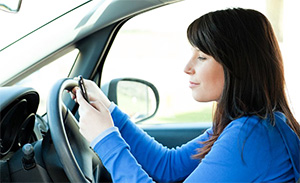 The Massachusetts State Senate is expected to consider a ban on hand-held mobile electronic devices while driving. Many feel a ban is long overdue and we agree.
The Massachusetts State Senate is expected to consider a ban on hand-held mobile electronic devices while driving. Many feel a ban is long overdue and we agree.
“Even New Hampshire has gone hands-free. It’s time for Beacon Hill to act,” wrote the Boston Herald editorial board.
The Senate is expected to consider the ban Thursday. Under the proposed legislation, Massachusetts drivers could still talk on the phone using hands-free technology.
Drivers would receive a $100 fine for the first violation, $250 for the second and $500 for all subsequent violations. Drivers cited three times would receive an auto insurance surcharge.
The bill would change the law in Massachusetts for all drivers over 18. Junior operators are already banned from cell phone use behind the wheel.
According to the National Safety Council, cell phone use is now estimated to be involved in 26 percent of all motor vehicle crashes. At any given moment of the day, 660,000 drivers are using cell phones or manipulating electronic devices while driving, according to the National Highway Traffic Safety Administration (NHTSA). The NHTSA also reported one survey found almost half of all drivers will answer an incoming call while driving. One in four drivers is willing to place a call on all, most, or some trips.
Texting While Driving Bans
In 2010, then-Massachusetts Governor Deval Patrick signed a bill into law which banned texting while driving. The state is in good company; today, 46 states and the District of Columbia have banned texting while driving. By contrast, only 14 states have banned hand-held cell phone use, including New Hampshire, Vermont and Connecticut. Maine and Rhode Island have banned texting while driving but hand-held cell phone bans have failed to gain enough support.
Related:
Read the Boston Herald’s recent editorial on a hand-held cell phone ban in Massachusetts.
Summary of the Safe Driving Law, Massachusetts Registry of Motor Vehicles
Read More


